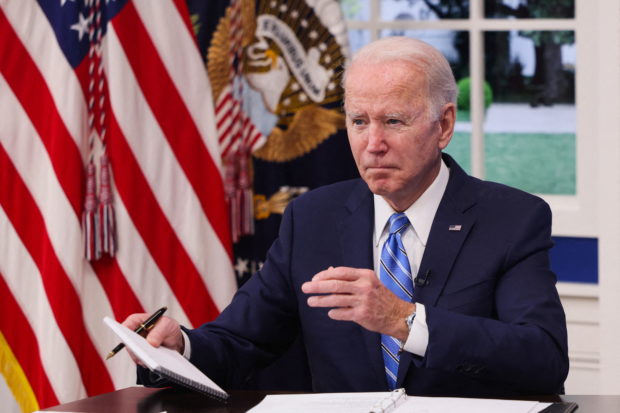‘We have more work to do,’ Biden says as Omicron surge looms

U.S. President Joe Biden and his COVID-19 Response Team hold their regular call with the National Governors Association to discuss his Administration’s response to the Omicron variant and to hear from the Governors on the needs in their States, in the South Court Auditorium at the White House, in Washington, U.S., December 27, 2021. (REUTERS)
WASHINGTON – President Joe Biden on Monday pledged to ease a shortage of COVID-19 tests as the Omicron variant threatened to overwhelm hospitals and stifle travel plans as it spread across the United States this holiday week.
“Seeing how tough it was for some folks to get a test this weekend shows that we have more work to do,” Biden said as he joined a call with the administration’s COVID-19 response team and state governors. “It’s clearly not enough.”
Biden said his administration’s steps include using the Defense Production Act to boost at-home test manufacturing and making it easier to use the Google search engine to find a nearby testing location.
The Centers for Disease Control and Prevention (CDC) said it was shortening the recommended time for isolation for Americans with COVID-19 to five days, as long as they show no symptoms, from its previous guidance of 10 days.
U.S. and state officials are bracing for a wave of more cases following the Christmas holiday, with hospitalizations ticking up as New Year’s loomed.
Article continues after this advertisementRising cases snarled air travel over Christmas weekend, with thousands of flights canceled as flight crews contracted the virus. Curtailed cruises and limited availability of testing crimped other plans as the more transmissible variant took hold.
Article continues after this advertisementOn Monday, U.S. airlines canceled nearly 1,000 flights, the fourth straight day of cancellations, denting travel-related stocks.
Over the last seven days, the average number of new cases has surged 55% to an average of over 205,000 new infections per day, according to a Reuters tally.
The number of hospitalized COVID patients, a lagging indicator, has risen 3% over the same period. Overall in December, the average number of new cases has risen 143% and hospitalizations climbed 31%.
Biden warned governors that the spike in cases was likely to overwhelm some hospitals, stretching staff and equipment like ventilators, particularly in areas where fewer people are vaccinated.
He told reporters he would follow guidance from his medical experts on whether to reduce the 10-day recommended quarantine period for Americans who test positive for COVID-19. He declined to say whether he endorses a vaccine mandate for domestic air travel, another step officials have discussed.
“They want to know what we think is going to happen from here,” he told reporters afterward as he departed Washington for his home state of Delaware, citing mutual cooperation. The White House separately said Biden told governors the administration would provide any additional resources they need.
Separately on Monday, Anthony Fauci, the top U.S. infectious disease official, urged people to avoid large New Year’s gatherings.
While officials say people can safely gather with families if they are vaccinated, larger celebrations are riskier.
“When we are talking about a New Year’s Eve party … I would recommend strongly stay away from that this year. There will be other years to do that, but not this year,” Fauci, Biden’s chief medical adviser, told CNN.
“We really still need to be extremely careful,” he said separately on MSNBC.
Last week, Biden announced reinforcements to bolster hospitals and testing, but some healthcare experts say that effort is too little, too late.
Peter Hotez, dean of Baylor College of Medicine’s National School of Tropical Medicine, said problems were exacerbated by issues such as shortages of testing and healthcare workers.
“You put all those things together into the mix and we have a very dangerous situation coming now in the country in the next couple of weeks,” he told MSNBC on Sunday.
gsg
For more news about the novel coronavirus click here.
What you need to know about Coronavirus.
For more information on COVID-19, call the DOH Hotline: (02) 86517800 local 1149/1150.
The Inquirer Foundation supports our healthcare frontliners and is still accepting cash donations to be deposited at Banco de Oro (BDO) current account #007960018860 or donate through PayMaya using this link.